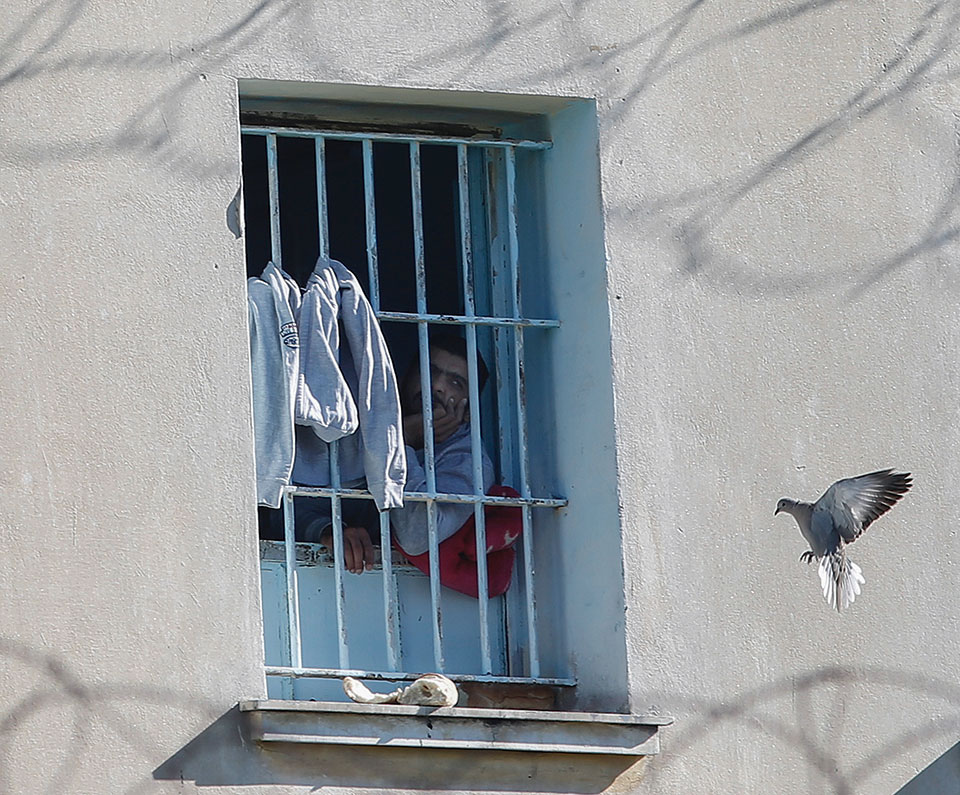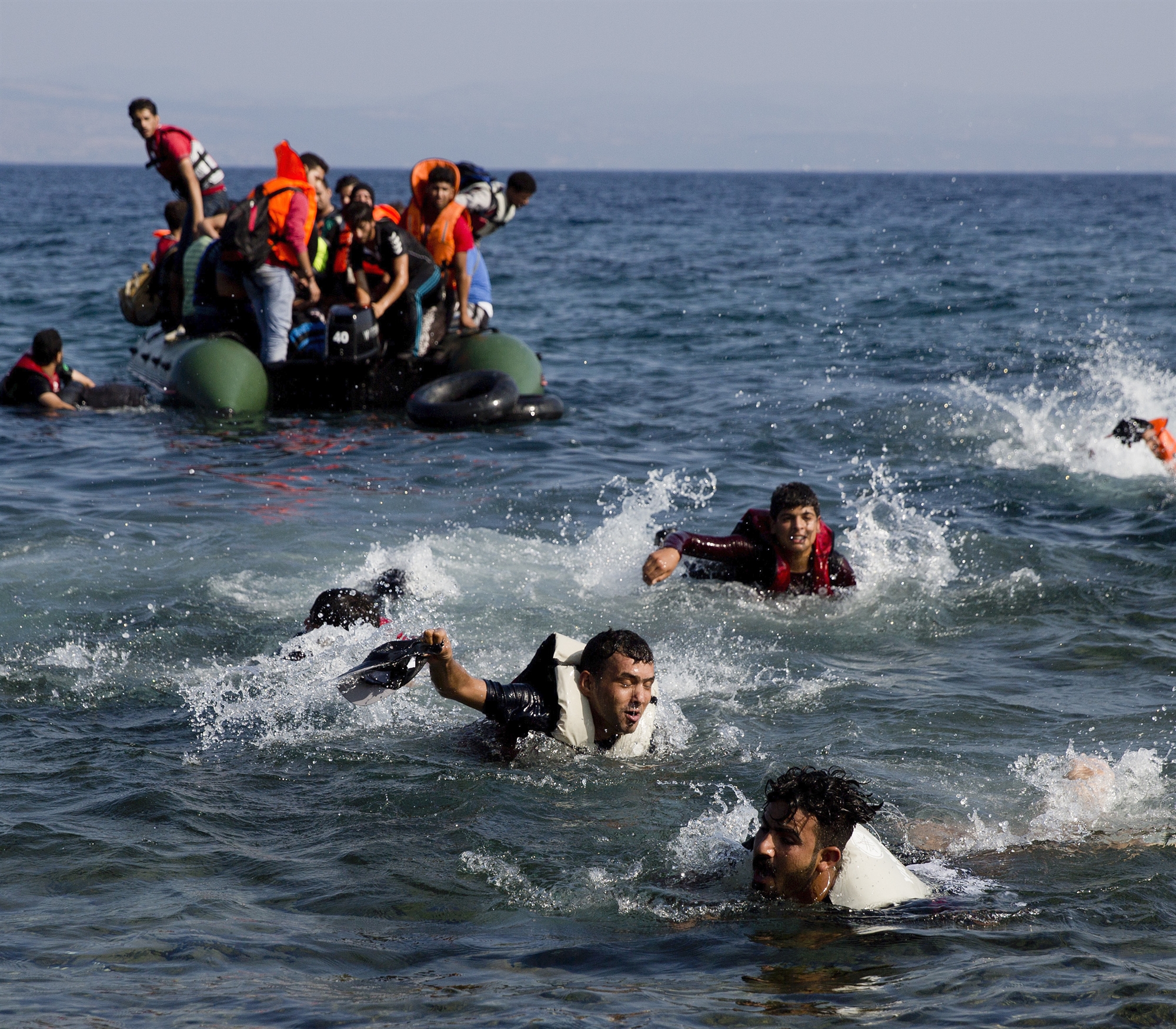
On Tuesday afternoon, police officers from the Komotini security department stopped the Greek driver of a white van to check on Egnatia Odos. They established that he illegally transported ten migrants hiding in the back of a car. He was taken to the prosecutor’s office and charged with a serious prison sentence of up to 100 years. On the same day, traffickers were arrested in Kavala and Ormenio. Defendants, Greeks and foreigners brought from Greek-Turkish border at Evros inland illegal migrants hiding in their cars. They also went on the road to the prison.
According to the data that “K” reveals20.8% overcrowded inmates prisons countries are on trial or convicted for smuggling migrants. In absolute terms, their number is 2,223 out of 10,678 prisoners. They are almost equal to the number of those serving sentences for drug trafficking (2508 people), who historically constituted the largest population group in prisons.
What is it for? An important factor is the strong immigration pressure and the subsequent increase in the number of arrests of illegal migrants. In the police district of Eastern Macedonia and Thrace, 91 people, Greeks and foreigners, were arrested and sent to prison in September, accused of transporting illegal immigrants. This is a record number in the annals of the Greek police, the previous record was broken only in August, when 74 people were arrested. traffickers. “Among them are Greeks, Syrians, as well as people from Balkan countries such as Serbia, for example,” he commented. talking to a competent official “K”.

Even more impressive are the official figures recently released by the Ministry of Citizens’ Protection. And this is because in the quarter of May – July 2022, 386 arrests of traffickers were made, which is a 58% increase compared to the corresponding period last year.
They are almost equal to the number of those serving prison terms for drug trafficking, which is the longest in history.
No suspension
However, there is another factor that explains the overabundance of detainees for trafficking in migrants. Experienced criminologists such as Zacharias Kesses and Christos Divanidis explain that under current law (Law 4251/2014), sentences handed down against defendants at first instance are immediately enforceable, as there is no suspensive effect on appeal. That is, if someone is sentenced to eight years in prison for transporting immigrants in the first instance and appeals, he will not be released, as is the case with other crimes, but will remain in prison until his case is heard in the second instance. Section 30 of Law 4251 states, verbatim, that “the time limit for lodging an appeal and appeal against a conviction for violations of this section shall not suspend the execution of the decision.” And the prescribed penalties, however, are considered quite severe, since the court can impose a sentence of ten years in prison for each of the caught smugglers who bring the detainee into the country.

“Heart attack” in Komotini
 One of the side effects of the phenomenon is the inability of the Komotini Detention Facility to accept new prisoners, as a result of which many of those arrested are held for long periods in the detention facilities of the Rhodopi Police Department in violation of the law. . In the Komotini prison, designed for 162 people, 319 people were detained on 1 October.
One of the side effects of the phenomenon is the inability of the Komotini Detention Facility to accept new prisoners, as a result of which many of those arrested are held for long periods in the detention facilities of the Rhodopi Police Department in violation of the law. . In the Komotini prison, designed for 162 people, 319 people were detained on 1 October.
Accordingly, yesterday, six of the total number of seventeen people who were in the pre-trial detention center EL.AS. detention orders were issued, but the prosecutor ordered that they be kept in the detention center due to the fact that the prison in Komotini could not accept them. In pre-trial detention centers EL.AS. there are also those who have been transferred from other prisons to be heard by the Rodopi Court of Appeal. “With the capacity of the pre-trial detention center is fifteen people, often up to 25 or even 27 people are stuffed into it,” Stavrula Tsatsana, president of the Rhodope Police Union, told K.
Overcrowding in most penitentiaries
In its September report, the Council of Europe’s Committee for the Prevention of Torture and Inhuman or Degrading Treatment or Punishment (CPT) rebuked Greece, noting that “too many prisoners are still being held in conditions that offend their human dignity.” The release of the report was preceded by a visit by members of the committee to the country between November and December 2021, when the number of prisoners at that time reached 11,182 and the prison capacity reached 10,175 people. The CPT even noted that there had been no tangible improvement in the treatment of prisoners compared to 10 years ago, when it again compiled a report on the situation in the country’s prisons. Ten months after the visit of members of the Council of Europe to Greece, the situation has slightly improved.
According to statistics from the General Secretariat for Combating Crime, as of October 1, the number of prisoners was 10,621. The problem of overcrowding remains acute at Korydallos 1 Detention Facility, which holds 1,719 detainees instead of 1,222 as expected from its capacity. The situation is equally problematic in other penitentiaries, such as Larisa, Corfu, Patras, Nigrita Serres, as well as the Avlona juvenile prison, where 325 prisoners remain with a capacity of no more than 220 people.
When asked about this, Spyros Karakitsos, a member of the board of directors of the Federation of Correctional Officers, told K that “prisoners sleep on the floor of the prison, in cells with a capacity of 6 prisoners 10, and there can be 3 or even 4 people in a cell.” President of the Federation of Foreign Guards Giorgos Kostikas was on the same wavelength. He stressed that “the system is at its limits, as while the number of prisoners has increased, the number of employees has significantly decreased due to layoffs and transfers.”
According to Yiannis Glikas, President of the Union of Forensic and Combat Lawyers, one of the reasons for the pressure on prisons is the amendment at the beginning of the year to the mandatory imprisonment of even those found guilty of misdemeanors when they are committed by a gang or a criminal organization. The amendment comes after the murder of a 19-year-old admirer of Ari at the beginning of the year in Thessaloniki. In any case, the heads of the General Secretariat put in “K” that they are making efforts to improve conditions of detention by unloading detention centres. At the beginning of the summer, the law, which came into force in 2021 and which establishes strict conditions for the transfer and stay of prisoners in rural prisons, was amended more leniently. The tightening resulted in the transfer to a closed prison of Dimitris Koufontinas, convicted of terrorism, and the escape of several more prisoners from rural prisons, as a result of which serious problems were observed in the very operation of rural shops. An estimated 400 inmates from closed detention centers were transferred to rural prisons over the summer, and 200 more are expected to follow the same route in the near future.
In addition, efforts are underway to commission the Drama prison before the end of the year, while, according to some estimates, the construction of a new prison in Crete will also be completed by the summer of 2023. Finally, the recruitment announcement for 480 new employees is coming to an end, but information indicates, however, that a large number of those already selected refuse to be placed in positions far from their place of residence on the grounds that the first salary does not exceed 700 euros.
Source: Kathimerini
James Springer is a renowned author and opinion writer, known for his bold and thought-provoking articles on a wide range of topics. He currently works as a writer at 247 news reel, where he uses his unique voice and sharp wit to offer fresh perspectives on current events. His articles are widely read and shared and has earned him a reputation as a talented and insightful writer.